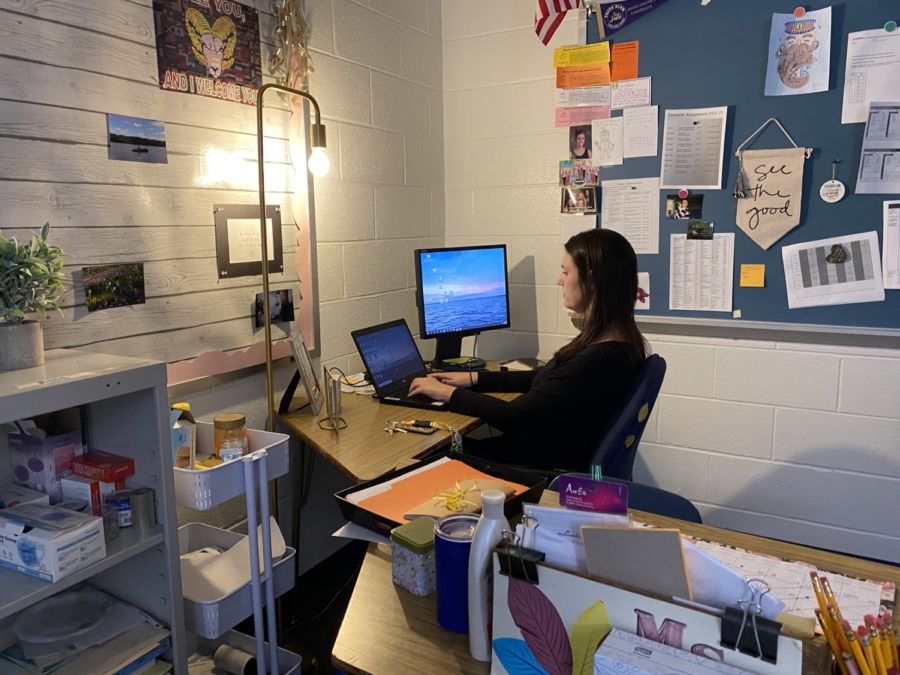Accommodations, Empowerment, & Awareness: a Glimpse of 504s at Robinson
Meaghan Fry, pictured in her office, is a teacher and 504 coordinator at Robinson.
A 504 plan lists accommodations for a student who is in need of curriculum adaptations in order to have an equal education experience as their peers. 4,481 FCPS students have a 504 plan, and 168 of those students attend Robinson, according to the Civil Rights Data Collection of 2017. That translates to two in every 45 students having a written plan of accommodations. In order to truly understand these statistics, one must first understand what a 504 plan is. A 504 plan originates in the Rehabilitation Act of 1973. The Rehabilitation Act of 1973 addressed the discrimination of people with disabilities generally, but section 504 is specific to the equalization of federally funded programs, which public schools fall under.
According to the Virginia Department of Education, 504s might cover physical impairments such as students with chronic conditions like diabetes, hard of hearing or visually impaired students, or even students undergoing cancer treatment. In the past 5 years, 504s have grown to cover more mental health issues and learning differences such as anxiety, depression, ADD/ADHD, and dyslexia. Some examples of accommodations are extended test time or deadline extensions, access to audio recordings of classes, preferential seating in classrooms, access to food and drink during class time, “flash” passes that allow students immediate access to their support team, and many others. There is no set list of available accommodations, instead, they vary based on each student’s needs and what their school can reasonably provide. Meaghan Fry, Robinson teacher and 504 coordinator says, “The big question is, what does the student require in order to have equal access to the general education curriculum”.
A well written 504 plan can be life changing for a student who struggles to thrive in traditional school settings and curriculum, which is why Meaghan Fry’s role is so vital to the student body. However, the title ‘504 coordinator’ doesn’t fully explain her job. “I love to call myself the 504 lady, because that’s pretty much who I am, “ said Fry. “I oversee 504 plans and their implementation, and I communicate with students, teachers and parents about accommodations.” Fry goes above and beyond in her role as 504 coordinator, and many students can call her a kind friend as well. “She is my favorite person in the whole world,” said a 504 student, who chose to remain anonymous. “She opens up her office to anyone, and she’s always there to listen.”
In the end, 504 plans are about student empowerment. Students are encouraged to self-advocate and discuss their accommodations in yearly meetings to create 504 plans, as well as communicate with their parents and teachers about their needs. Fry said, “My goal is to empower students and for them to really start to take ownership of their education”
Author’s note:
As a student with a 504 plan, I hope this story is a tool that the student body of Robinson can use to better understand their peers who may have impairments that require accommodations. I have a chronic condition called POTS (postural orthostatic tachycardia syndrome) that affects my autonomic nervous system, and impairs bodily functions such as blood pressure, temperature regulation, and many others. As a result, I struggle with fatigue, dizziness and lack of focus in everyday activities. I’ve been incredibly lucky to have caring and intentional support from my school counselor, Taylor Nelson, my parents, and 504 coordinator Meaghan Fry. Though all the staff at Robinson are very knowledgeable, I’ve realized that many of my friends and fellow peers have never heard of 504s. I believe this should change and that impairments or disabilities should become less taboo subjects. I asked Fry what advice she would give to the peers of students with 504s, and she said, “Don’t be afraid to ask questions, don’t make assumptions because we are not defined by our limitations or impairments, it’s just one part of us.” I wholeheartedly agree with this take, and I hope this story has done its part to destigmatize this country-wide topic. In the end, the best way to support fellow students and promote better understanding is to simply start the conversation. You might just realize that you have more in common than you think! I believe that Fry put it best, “All of us have our own strengths and weaknesses; for some, those strengths and weaknesses work well with the traditional school system, and for others they don’t, and that’s ok.”



